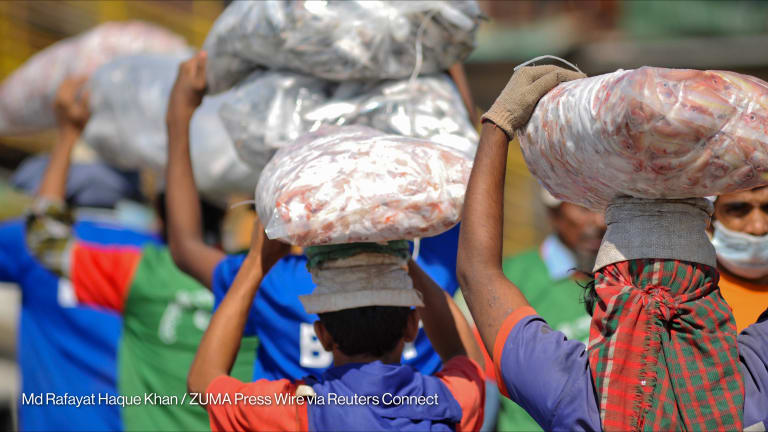
News that the world has a “50:50” chance of exceeding the 1.5 degrees Celsius mark in the next five years is a wake-up call to the world. If you’re a cotton farmer struggling with drought in South Africa or with bollworm — which is linked to high rainfall — in Punjab, the prospect of a more erratic climate comes as unwelcome news.
As across the global agricultural landscape, the cotton industry has been investing heavily in building its climate resilience for some years now. Research into drought-tolerant breeds is continuing apace, for instance, as are tools for assessing and planning for future climate risks.
Awareness is one thing, but the ability to act is another. An estimated 350 million people currently rely on cotton production for their livelihoods, half of whom face high or very high exposure to climate risk. Of these, most are smallholders, who, even if they wanted to act on climate change, lack the economic means or market incentives to do so.
Loud as the climate alarm bells ring and as much as global development agencies fret, transitioning agriculture onto a sustainable footing simply won’t happen without smallholder buy-in.
As people who depend on the Earth’s productivity for their livelihoods, farmers have more incentive to steward the natural environment than anyone.
But the returns on climate-friendly agriculture need to pay clearly, quickly, and fairly. On the first two, there is an increasingly compelling case to be made. In India, for example, we have been able to show that over a season, Better Cotton Initiative farmers’ profits were 24% higher, while using a lower volume of synthetic pesticides and fertilizers, than those not implementing more sustainable practices.
Climate-positive farming is an agricultural issue … It’s also a finance issue, for which a huge increase in capital investment is needed. But, at its heart, it is a justice issue.
—Compared to the vicissitudes of the market, multiyear purchasing guarantees from large buyers present a far more attractive prospect for agricultural producers looking to transition. In Brazil, for example, the U.S. commodity trader Bunge offers long-term financing to soybean producers that have robust anti-deforestation policies in place. However, opportunities for smallholders to negotiate such complex contractual arrangements is difficult, if not impossible.
The same hurdle presents itself with conventional carbon finance projects. Take carbon offsetting, for example. On paper, climate-smart farmers that promote carbon-reducing practices such as cover cropping and reducing tillage are well positioned to sell credits. Yet, proving the climate efficacy of such efforts is by no means straightforward. And, even if a farmer can, registering on a carbon credit marketplace such as Nori or even locating a relevant credit programme presents a challenge.
But imagine that wasn’t the case. Imagine, instead, a world in which development agencies, multilateral banks, finance institutions, commercial buyers, and philanthropists come together to devise funding mechanisms that meet the financing needs of small farmers — conservatively estimated at $240 billion per year.
Problem solved, right? Regrettably, no. Clear and quick as climate-positive farming returns may one day become, if they are not distributed fairly, then climate transition in agriculture is dead in the water before it gets going.
Of course, “fairness” is a subjective term. By any measure, however, ensuring it includes the 95% of farmers around the world who operate on less than 5 hectares has to be central. Likewise, guaranteeing equal access and opportunities within this grouping of some 570 million agricultural households is every bit as critical.
Gender injustice presents the starkest example. In many agricultural regions, especially in the global south, women farmers lack formal rights, such as land ownership, and struggle to access credit, training, and other key support mechanisms. This is despite exercising a significant influence over farming decisions. In India and Pakistan, for instance, the majority of cotton farm workers are female.
Producers, buyers, and other key players within the agricultural sector can and must seek ways of incorporating issues of social justice and inclusivity into their climate efforts. Without deliberative action, it simply won’t happen. Even then, our experience at Better Cotton, where we have been prioritizing gender equality for a number of years now, suggests change takes time.
Climate-positive farming is an agricultural issue, characterized by technological innovation and smart practices. It’s also a finance issue, for which a huge increase in capital investment is needed. But, at its heart, it is a justice issue. Bringing marginalized farmer groups into the fold is not only the right thing to do; it is a condition of effective climate action in agriculture.
Modern industrial agriculture has seen yields spike. But its emphasis on high capital expenditure and fossil fuel-based inputs has also seen economic inequality and environmental damage become baked into the system. Responding to the urgent threat of climate change presents an opportunity to resolve these systemic failings.









